Is the eggplant a fruit or a vegetable? This question might seem simple, but the answer is a bit more complex. Depending on how you look at it, eggplant can be both.
I’ll explore the botanical and culinary classifications of eggplant. You’ll learn why it’s considered a fruit by scientists but used as a vegetable in the kitchen. Plus, I’ll dive into its rich history, various types, and the many health benefits it offers.
Ready to uncover the secrets of this versatile plant? Keep reading to find out how eggplant fits into your diet and why it deserves a spot on your plate.
- Related article: What Sets Fruits and Vegetables Apart
5 Key Takeaways on Is Eggplant a Fruit or Vegetable
- Eggplants are fruits. They grow from a single flower and have seeds inside.
- In the kitchen, eggplants are used as vegetables. You can bake, roast, grill, or fry them in many recipes.
- Eggplants are full of nutrients. They have fiber, vitamins, minerals, and antioxidants. Plus, they are low in calories.
- There are many types of eggplants. Some common ones are Graffiti, Indian, Globe, Italian, Chinese, Japanese, and White. Each type has its own look and taste.
- Eggplants are good for your health. They help your heart, manage blood sugar, control weight, improve brain health, and keep your eyes healthy.
Is Eggplant a Fruit or Vegetable?
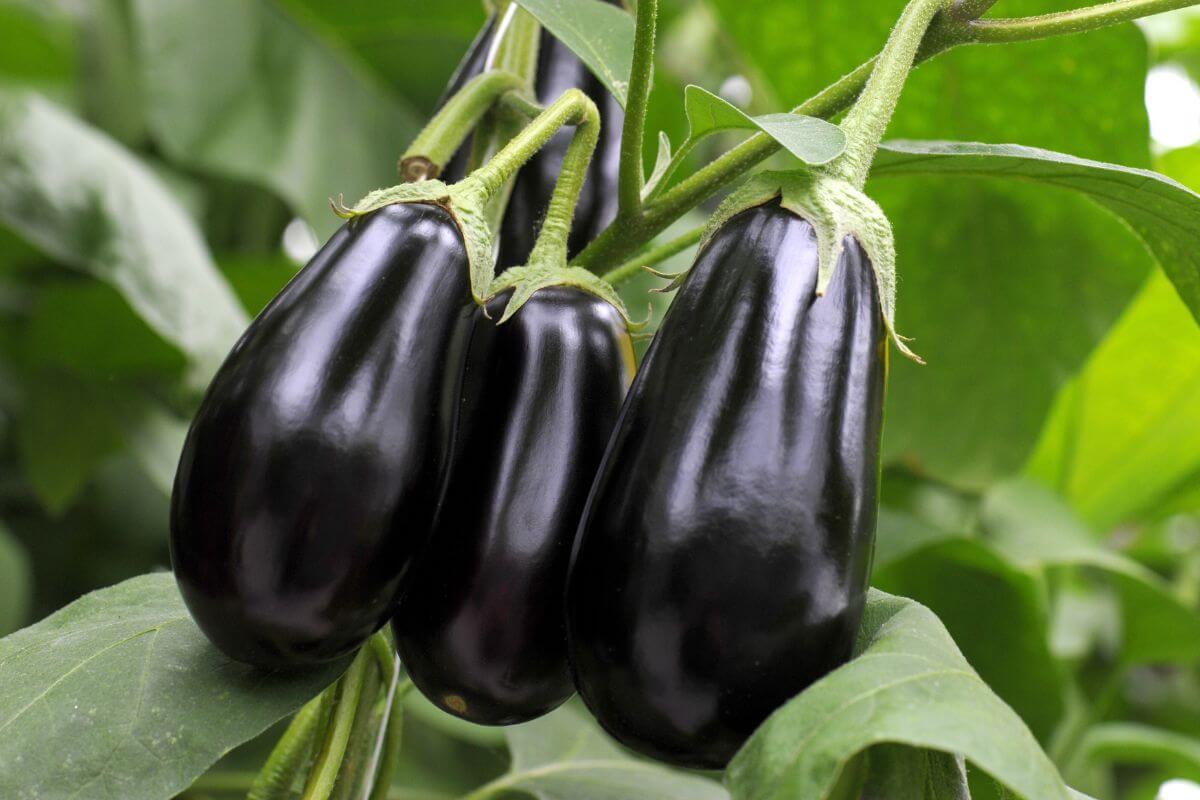
Eggplants are both a fruit and a vegetable — it just depends on how you look at it and how you use it. Below is a table that explains the case for the eggplant’s fruit and vegetable classifications.
| Classification | Reason |
|---|---|
| Botanical – Fruit | Eggplants belong to the nightshade family and are considered a fruit. Specifically, they are berries because they grow from a single flower and have seeds inside. |
| Culinary – Vegetable | Eggplants are treated as vegetables in cooking. They are used in baking, roasting, grilling, and frying, similar to other fruits like tomatoes and cucumbers that are used as vegetables in recipes. |
Eggplants are part of the five-portions-a-day group of fruits and vegetables (source). They are full of nutrients and antioxidants.
Where Did the Eggplant Get Its Name?
Eggplants have a rich history in cooking. They come in colors like black, red, green, and white. Their names change based on where you live.
In the U.S., they got the name “eggplant” because early varieties were the size of an egg. These were the first types to reach North America.
In the South, people called them Guinea Squash. This name came from their arrival in West Africa in the 18th century.
In parts of Europe, the name is aubergine. This name comes from the ancient Arab word “al-badinjan.” The Arabic name also influenced India, where it’s called “brinjal.”
Eggplants are versatile and have many names and colors. This makes them unique in the world of fruits and vegetables.
What Are Some Eggplant Varieties?
There are numerous varieties of eggplant available, so if you’re not sold on this fruit, you may not have found the best variety for your taste buds.
1. Graffiti, Zebra, or Sicilian Eggplant

Graffiti eggplants stand out with their violet and ivory stripes. Their thin skin has small seeds inside. You can eat them puréed or whole.
You can recognize graffiti eggplants by their shiny, striped skin. Inside, the flesh is creamy to pale white with small, edible seeds. These eggplants are versatile. You can sauté, grill, roast, or bake them. Their small size means they cook fast and you don’t need to peel the skin.
They taste great with tomatoes, squash, onions, herbs, spices, and cheeses.
2. Indian Eggplant
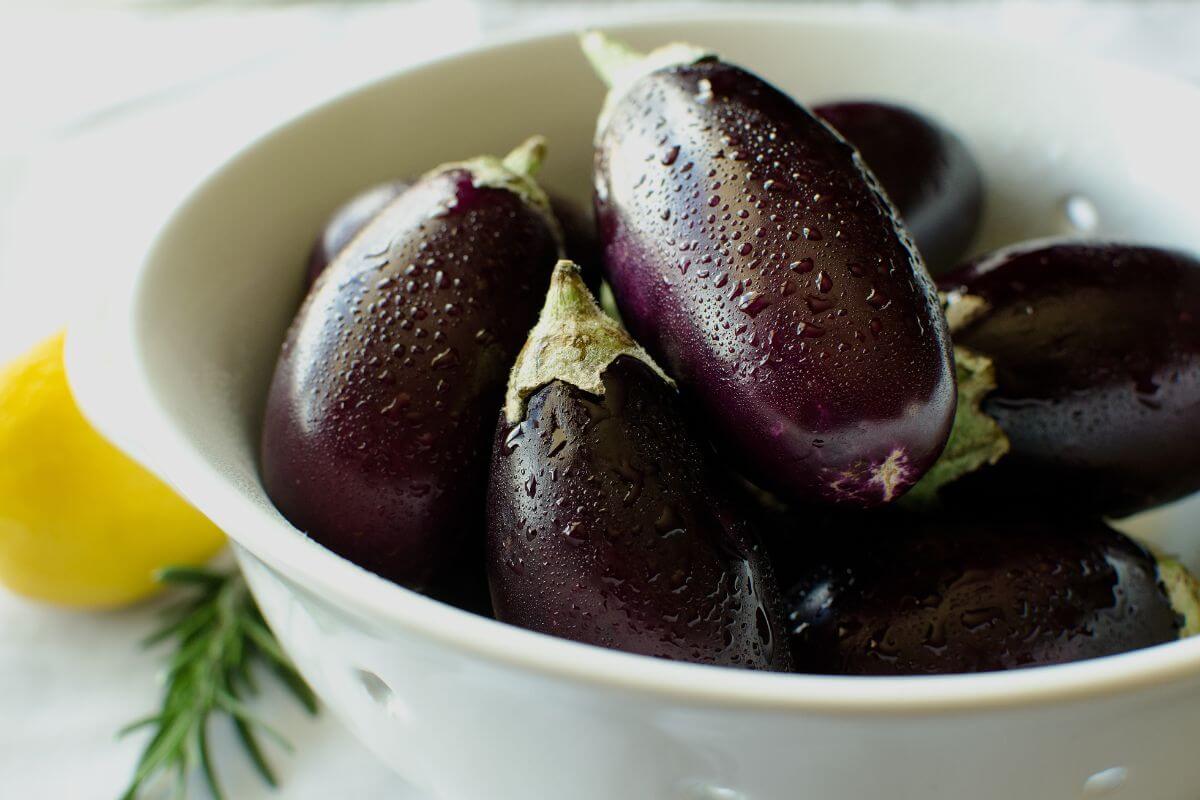
Baby eggplants, also called Indian eggplants, are small and dark purplish-red. They look like cherries and are often used in Indian curry dishes.
Indian eggplants are key in Indian cuisine. You’ll find them in sambar, dalma, and bharta. You can stuff, roast, grill, or stir-fry them. Their small size makes them great for quick cooking.
3. Globe or American Eggplant
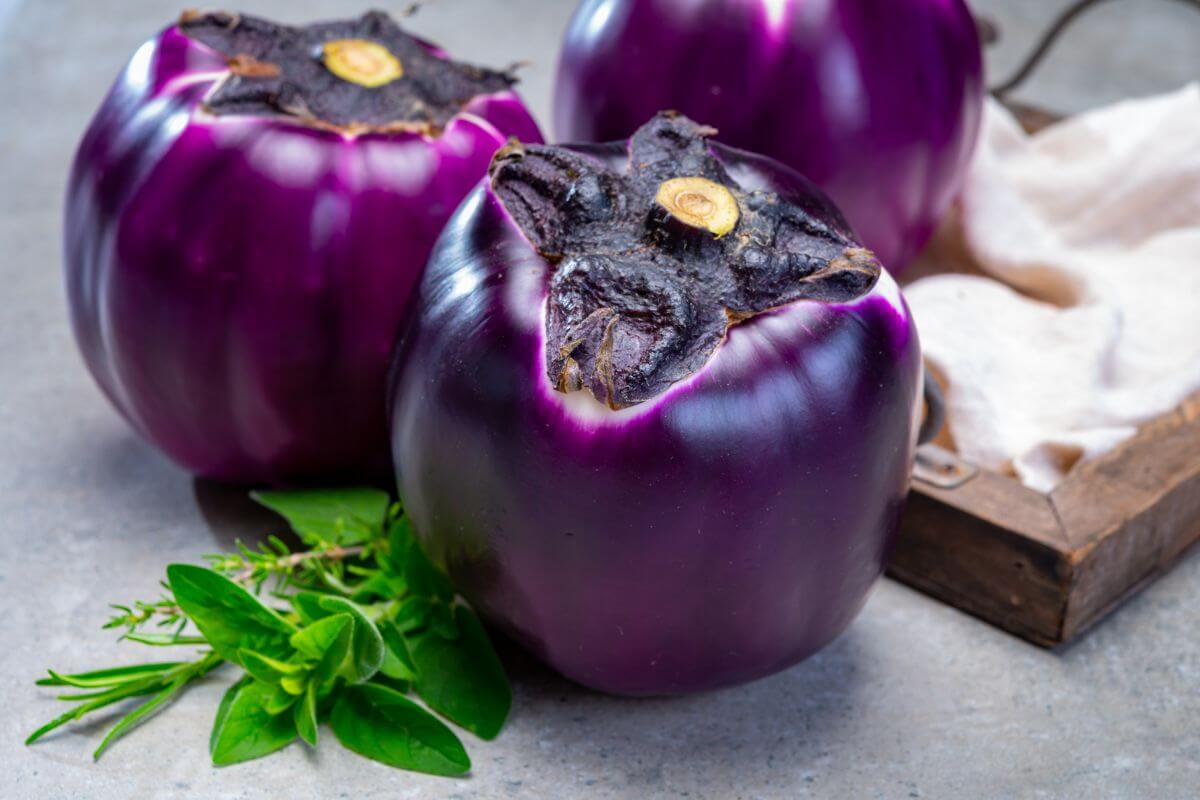
American eggplants, often called “Globe Eggplants,” are the ones you usually see in your supermarket. They are short and squat with a deep purple color. These eggplants are very meaty and can replace protein in your diet.
You can cook Globe eggplants in many ways. Roast, grill, sauté, or bake them. They work well in dishes like eggplant parmesan, ratatouille, baba ghanoush, and moussaka. Their large size is perfect for stuffing with meat, cheese, or rice.
4. Italian Eggplant
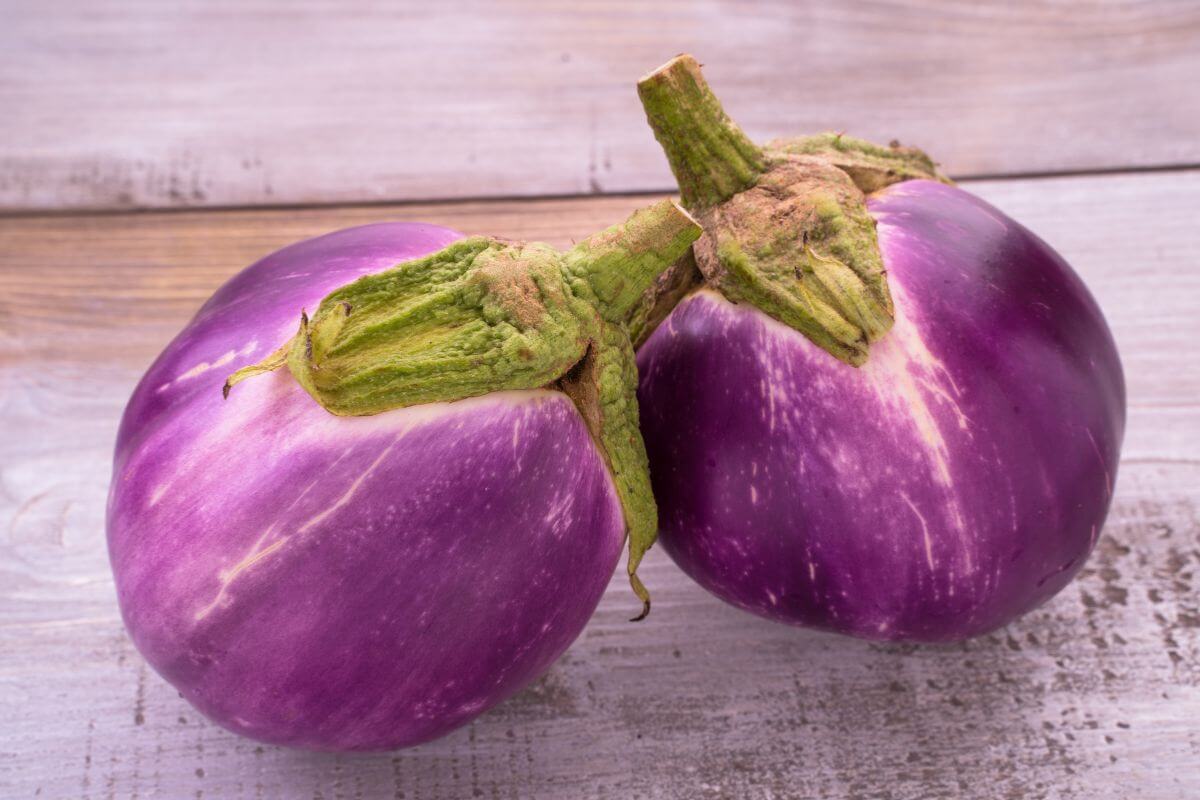
The Italians know their food, and their eggplant is no exception. The Italian variety looks like the Globe Eggplant but is sweeter and smaller. The flesh is tender. It’s perfect for dishes like melanzane parmigiana or caponata.
You can use them in eggplant parmesan, ratatouille, and pasta alla norma. Their size makes them great for stuffing with meat, cheese, or breadcrumbs.
5. Chinese Eggplant

Chinese eggplants taste more delicate and slightly sweet than larger Western eggplants. They also have a tender, creamy texture when cooked. Plus, they have fewer seeds and less bitterness.
These eggplants are essential in many Asian cuisines, especially Chinese and Japanese dishes. They’re perfect for quick cooking methods like stir-frying, steaming, or grilling. They also go well with bold seasonings and sauces.
5. Japanese Eggplant
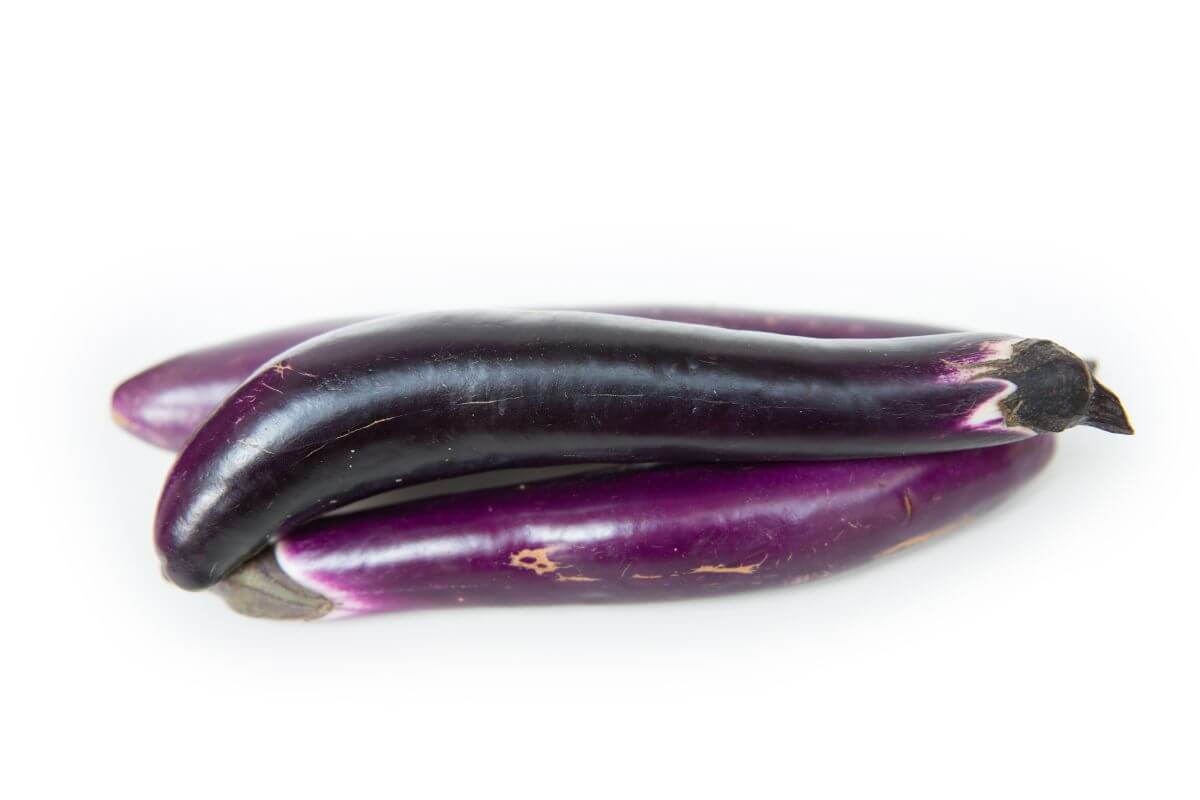
The Japanese eggplant looks like the Chinese eggplant. It has a slender shape and dark purple color. They cook quickly which makes them great for stir-fries.
The flesh is spongy so it absorbs flavors well. You don’t need to peel the thin skin which adds to its versatility. Japanese eggplants are popular in Asian cuisines like Japanese, Chinese, and Korean dishes.
6. White Eggplant
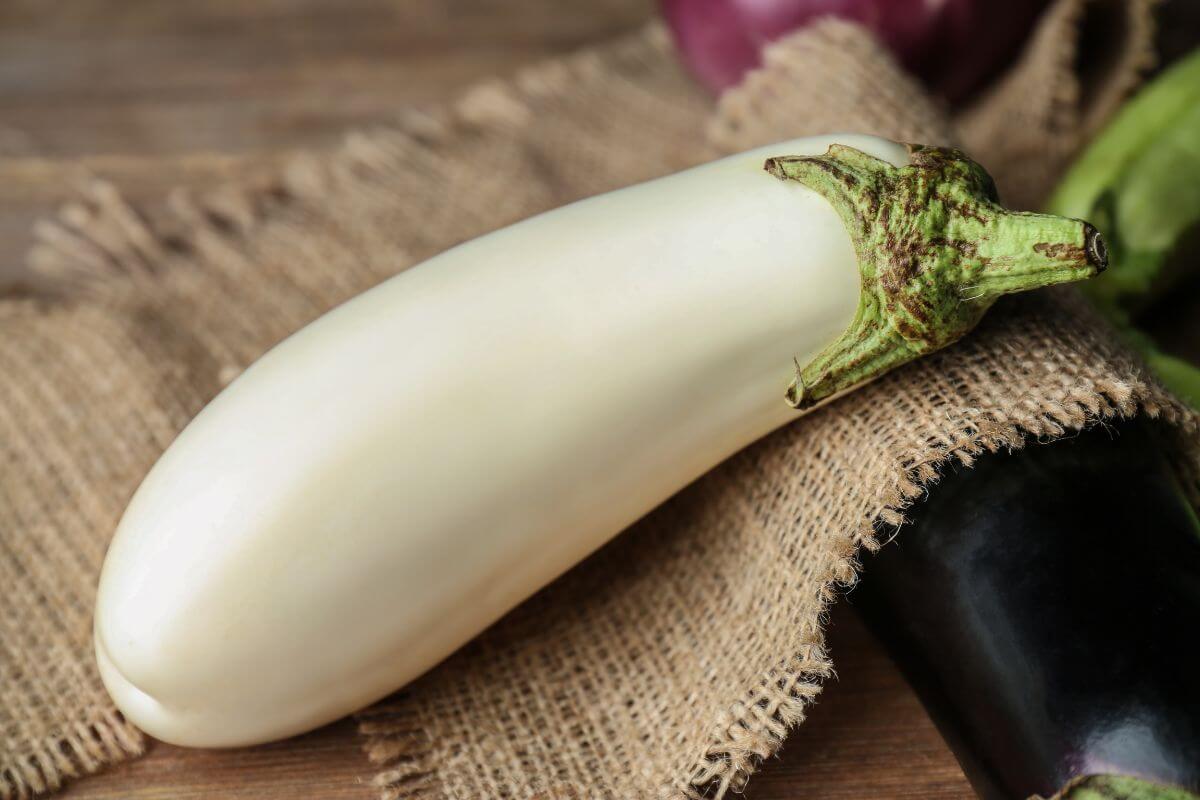
White eggplants have bright white skin but inside they look like a typical eggplant. Originally, all eggplants had white skin. They lost popularity to darker globe eggplants because those are better at resisting pests and drought.
You won’t see white eggplants as often as purple ones. But you can find them at specialty grocery stores and farmer’s markets. They don’t have anthocyanins, which give purple eggplants their color. This means white eggplants might have fewer antioxidants.
You can cook white eggplants just like purple ones. Try grilling, roasting, sautéing, or adding them to stews and curries.
What Are the Health Benefits of Eggplants?
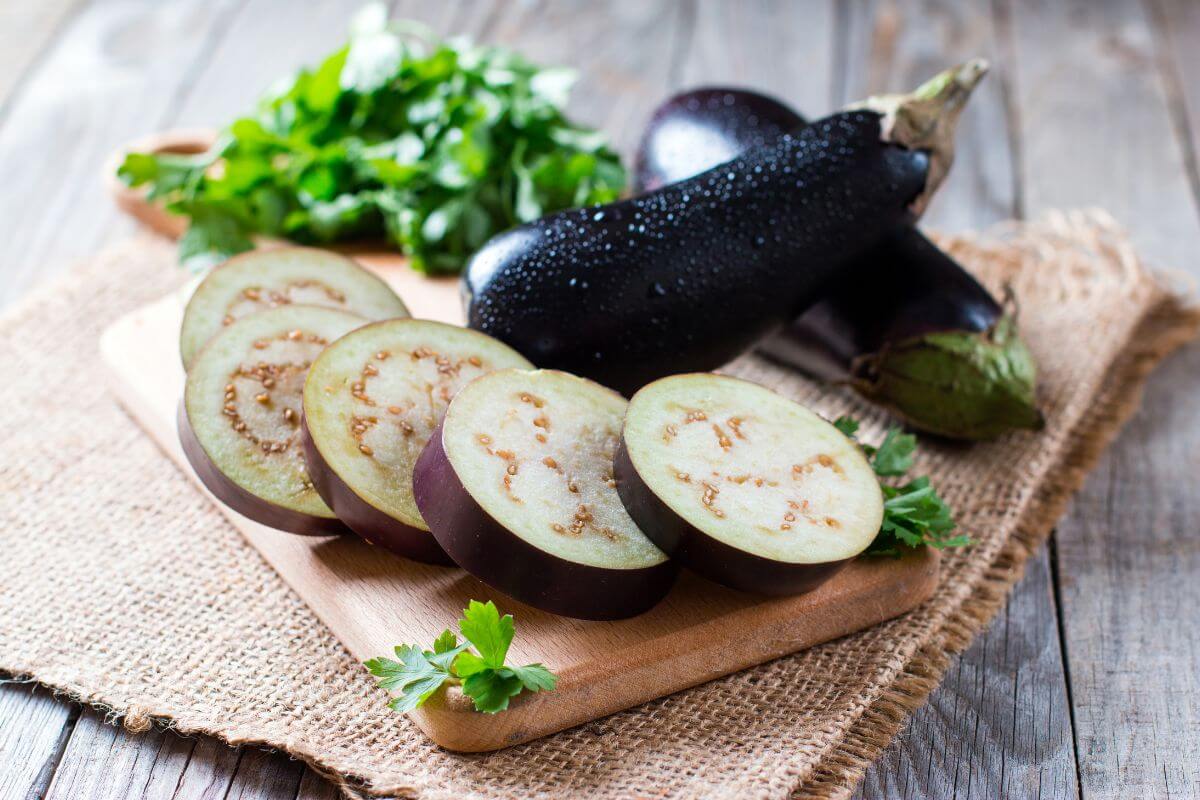
Eggplants have a delicate flavor and unique texture. They also offer surprising health benefits that might make you want to add them to your diet.
Eggplants are nutrient-dense. They contain many minerals, vitamins, and fiber, and are low in calories.
| Nutrient | Amount per Cup (82 grams) | % of Daily Recommended Intake (RDI) |
|---|---|---|
| Fiber | 3 grams | – |
| Carbohydrates | 5 grams | – |
| Protein | 1 gram | – |
| Vitamin C | – | 3% |
| Vitamin K | – | 4% |
| Potassium | – | 5% |
| Folate | – | 5% |
| Manganese | – | 10% |
You also get small amounts of niacin, copper, and magnesium. All this in just 20 calories.
Eggplants are low in sodium, fat, and cholesterol. Plus, one cup of cooked eggplant has about 30 calories.
1. Eggplants Help Prevent Chronic Diseases Like Heart Disease and Cancer
The eggplant is not just tasty. It’s packed with nutrients and loaded with antioxidants. Antioxidants protect your body and cells from damage caused by free radicals (source).
Eggplants Reduce Risks of Cardiovascular Disease
Eating eggplants can lower your risk of heart disease because of their fiber and antioxidants. Researchers gave rabbits eggplant juice every day for two weeks. By the end, the rabbits had lower triglycerides and LDL cholesterol levels. Another study showed eggplant improved heart function (source).
Eggplants have fiber, potassium, vitamin C, vitamin B6, and antioxidants like nasunin and chlorogenic acid. These nutrients can lower blood pressure, reduce arterial stiffness, and manage high cholesterol.
Eggplants May Help Prevent Cancer
Eggplants have high fiber content which might help prevent cancer. Eating a fiber-rich diet is linked to a lower risk of some cancers.
Eggplants also contain polyphenol antioxidants like anthocyanins (nasunin) and chlorogenic acid. These can protect your cells from damage by free radicals and might stop tumors from growing and spreading.
But we need more human studies to confirm their cancer-fighting power.
2. Eggplant Aids in Blood Sugar Management
Want to keep your blood sugar levels in check? Add eggplant to your diet.
Eggplant has a low glycemic index of about 15. This means it hardly affects your blood sugar levels. It’s a great choice if you need to manage your blood glucose.
Eggplant offers several benefits. It’s high in antioxidants. It also has three grams of fiber per cup. This is good for your gut and helps regulate your blood sugar.
The fiber in eggplant passes through your digestive tract intact. Fiber absorbs sugar in the body and slows digestion. This slower absorption keeps your blood sugar stable (source).
Natural plant compounds in eggplant, called polyphenols, may also help. They can reduce sugar absorption and increase insulin secretion. This results in lower blood sugar levels. Because of its high fiber content, eggplant is useful in diets for controlling diabetes.
3. Eggplants Aid in Weight Management
Eggplants taste great and make a fantastic diet food. They are low in calories and high in fiber.
The fiber in eggplants moves slowly through your digestive system. This makes you feel full longer so you won’t want to eat more calories.
You can use eggplants as a low-calorie substitute in recipes that usually call for high-calorie vegetables.
4. Eggplants May Help With Brain Health
Eating eggplants might be good for your brain. Studies on animals show that nasunin in eggplant skin can protect brain cell membranes. It also helps with nutrient transport and waste removal. This could support cognitive function.
Eggplants have potassium. Potassium acts as a vasodilator. This means it helps increase blood flow to the brain. Better circulation brings more oxygen and nutrients to brain cells. This supports cognitive function and mental health.
Eggplants are rich in antioxidants and phytonutrients. Animal studies suggest these may protect the brain. They might reduce inflammation and improve communication between brain cells.
Phytonutrients in eggplants may boost cognitive abilities and memory. They protect brain cells and improve blood flow. This could support analytical thinking and overall brain health.
5. Eggplants May Help Maintain Eye Health

Eggplants have antioxidants like lutein and zeaxanthin. These help keep your eyes healthy and may prevent age-related macular degeneration.
Potassium in eggplants improves blood flow to your eyes. Better circulation means more oxygen and nutrients reach your retina and other eye tissues. This supports overall eye health.
Research shows eggplant antioxidants might lower intraocular pressure. High pressure is a risk factor for glaucoma. Lowering it can help manage this serious eye condition.
Antioxidants in eggplants may also prevent cataracts. They protect the eye’s lens from oxidative damage over time.
Eggplants have vitamin A, which is vital for corneal health and night vision. Without enough vitamin A, you could get dry eyes and struggle to see in low light.
Different Ways You Can Add Eggplant to Your Diet

Eggplant is a versatile fruit often used in savory dishes as a vegetable. You can grill, roast, or sauté it with olive oil and seasoning. It helps cut calories and carbs while boosting nutrients and fiber.
From eggplant parm to stir-fry, ratatouille to roasted veggies, this purple gem shines in many dishes.
Here are easy ways to add eggplant to your meals:
- Roasted Eggplant – Slice into rounds or cubes. Toss with olive oil, salt, and pepper. Roast at 400°F until tender and caramelized. Add roasted eggplant to salads, grain bowls, pasta, or serve as a side.
- Grilled Eggplant – Brush slices with oil. Grill until charred and soft. Perfect for veggie burgers, wraps, or as a side.
- Eggplant Parmesan – Bread and bake slices. Layer with tomato sauce and cheese for a classic casserole.
- Baba Ghanoush – Roast eggplant. Blend the flesh with tahini, lemon juice, garlic, and spices for a creamy dip.
- Eggplant Curry or Stew – Dice and simmer in curries, stews, or braises with spices and veggies.
- Eggplant Lasagna – Use thin slices instead of noodles for a low-carb, veggie-packed lasagna.
- Eggplant Meatballs or Burgers – Grate or mash roasted eggplant. Mix into meatballs or veggie burger patties.
- Eggplant Dip or Spread – Puree roasted eggplant with garlic, herbs, and olive oil for a dip or spread.
Eggplant also stars in many Mediterranean dishes like Pasta Norma, Caponata, and Eggplant Parmesan.
Is Eggplant a Fruit or Vegetable? Final Thoughts
Is eggplant a fruit or a vegetable? Well, it’s both. Eggplant offers vitamins, minerals, and dietary fiber. It supports weight management because it’s low in calories. It also lowers cholesterol and prevents heart disease. Plus, it helps control blood sugar.
You can find different kinds of eggplants. Each type can be used in a unique dish you’ll love. Try adding eggplant to your meals. It tastes great and boosts your health.
For more on fruits and vegetables, check out these articles:

